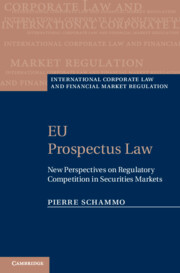Book contents
- Frontmatter
- Contents
- Preface and acknowledgements
- List of abbreviations
- Table of cases
- Table of legislation
- Introduction
- PART I Prospectus disclosure in a wider institutional context
- PART II Prospectus disclosure regulation
- PART III Prospectus disclosure enforcement
- PART IV Prospectus disclosure and regulatory competition
- 8 Introduction
- 9 Regulatory competition and EU decision-making
- 10 Regulatory competition and the prospectus directive: the issuer choice policy dispute
- PART V Conclusions and suggestions for the future
- Select bibliography
- Index
8 - Introduction
from PART IV - Prospectus disclosure and regulatory competition
Published online by Cambridge University Press: 01 June 2011
- Frontmatter
- Contents
- Preface and acknowledgements
- List of abbreviations
- Table of cases
- Table of legislation
- Introduction
- PART I Prospectus disclosure in a wider institutional context
- PART II Prospectus disclosure regulation
- PART III Prospectus disclosure enforcement
- PART IV Prospectus disclosure and regulatory competition
- 8 Introduction
- 9 Regulatory competition and EU decision-making
- 10 Regulatory competition and the prospectus directive: the issuer choice policy dispute
- PART V Conclusions and suggestions for the future
- Select bibliography
- Index
Summary
Regulatory competition has been a topic in law, economics and political science for many years. In law and economics it has proven to be of enduring interest, especially in the literature on company law and securities regulation'. Regulatory competition describes a fairly simple idea. States compete (in an effort to attract capital, investment, revenue-generating business, and so on) by attempting to offer legal regimes which a given regulated population is likely to prefer. This process is meant to lead to better laws, rules or regulations. To kick off this process, proponents of regulatory competition, turn to regulatory arbitrage which, in essence, describes the action of picking and choosing between different regulatory regimes. Regulatory arbitrage presupposes that actors can ‘exit’ a regulatory regime either by relocating to another jurisdiction or better, by taking advantage of some kind of legal mechanism that allows them to choose between different legal regimes. Whatever the precise arrangements, regulatory arbitrage is seen as the ‘engine’ of regulatory competition. That is in essence the thrust of the argument.
A flawed theory Yet, despite the interest in the subject matter, the heydays of regulatory competition as a normative proposition in the securities field are over. The reason for this can arguably be traced back to a number of factors. One factor is that the so-called theory of regulatory competition has shaky theoretical foundations. It derived initially from Charles Tiebout's pure theory of local expenditures. But Tiebout's findings quickly became overinterpreted and overblown in the literature on regulatory competition.
- Type
- Chapter
- Information
- EU Prospectus LawNew Perspectives on Regulatory Competition in Securities Markets, pp. 283 - 287Publisher: Cambridge University PressPrint publication year: 2011



